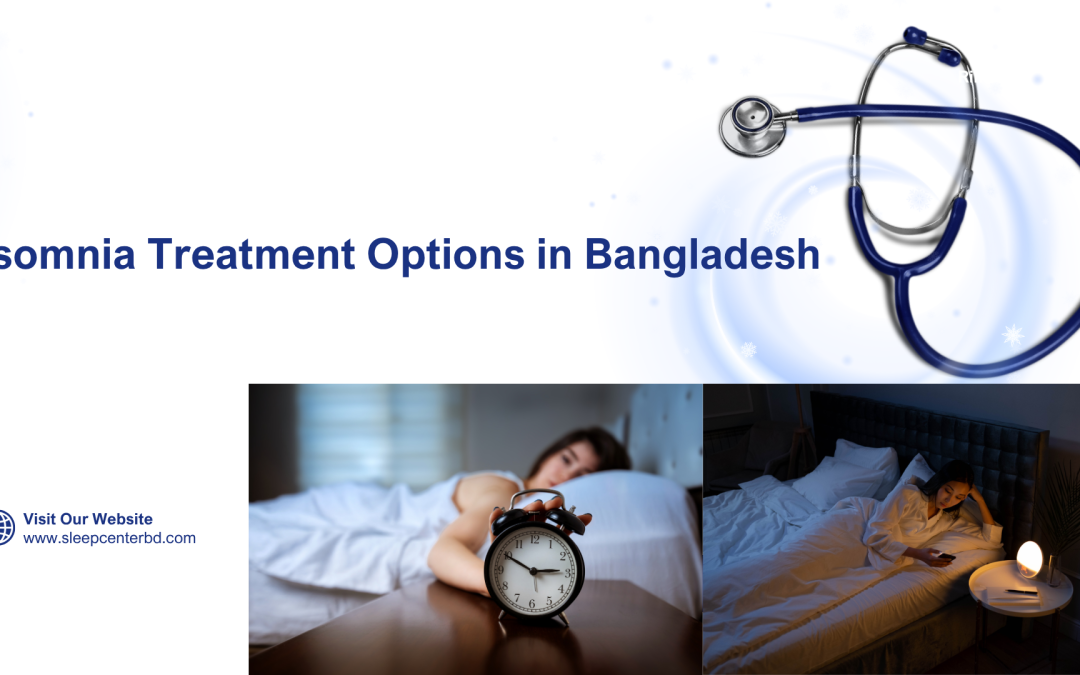Understanding Insomnia in Bangladesh
Insomnia—difficulty falling asleep, staying asleep, or getting restful sleep—is a common problem worldwide, and Bangladesh is no exception. Surveys suggest that during high-stress periods like the COVID‑19 pandemic, insomnia affected roughly 18–46% of Bangladeshi adults, averaging around 23%.Chronic insomnia can lead to daytime fatigue, mood disturbances, trouble concentrating, and reduced quality of life.
Signs You Need Professional Help
Consider consulting a specialist if:
- Sleep issues persist beyond 3 months (chronic insomnia).
- You experience daytime drowsiness, mood swings, cognitive difficulties.
- Natural remedies and lifestyle adjustments don’t help.
- Underlying conditions like anxiety, depression, sleep apnea—or medication side effects—may be worsening your sleep.
Bangladesh is home to qualified psychiatrists and sleep specialists in Dhaka, such as Dr Md. Tayabur Rahman, Prof Dr Ahsanul Habib, and team at Sleep Center BD, offering both psychological therapies and full sleep lab diagnostics
Natural Remedies for Better Sleep
Many prefer starting with non-pharmacological methods:
Herbal supplements:
- Valerian root, chamomile, lavender, passionflower – all noted for mild sedative effects
- Valerian root, chamomile, lavender, passionflower – all noted for mild sedative effects
Dietary choices:
- Tryptophan-rich foods (e.g., turkey, chicken, milk) enhance serotonin and melatonin production
- Avoid caffeine, nicotine, alcohol—especially after midday
- Tryptophan-rich foods (e.g., turkey, chicken, milk) enhance serotonin and melatonin production
Lifestyle & environment:
- Maintain regular sleep–wake times.
- Keep the bedroom dark, quiet, cool.
- Electronic devices should be switched off at least an hour before bed
- Maintain regular sleep–wake times.
Relaxation techniques:
- Warm baths, lavender sprays (locally available for Tk 2,500–5,000), essential oils, gentle yoga, meditation, deep breathing, music therapy
- Warm baths, lavender sprays (locally available for Tk 2,500–5,000), essential oils, gentle yoga, meditation, deep breathing, music therapy
How Sleep Therapy Can Help
Specialist centers such as Sleep Center BD in Dhaka offer:
- Sleep studies (PSG) to diagnose issues like sleep apnea and insomnia
- CPAP/BiPAP therapy for sleep apnea—important as apnea disrupts restorative sleep.
Accessing therapy enables personalized insights into sleep patterns and tailored interventions.
The Role of Medication in Treating Insomnia
When necessary, pharmacological options include:
- Prescription agents like Somarant (suvorexant)—an orexin receptor antagonist used in Bangladesh.
- Historically, benzodiazepines and Z‑drugs were prescribed
Such medicines can be effective short-term but may pose risks—like dependency, tolerance, or daytime drowsiness. Medical supervision is essential.
Lifestyle Changes to Improve Sleep
- Stick to consistent bedtime and wake-up schedules.
- Avoid heavy meals, caffeine, and alcohol close to bedtime.
- Keep your bedroom cool, dark, and quiet—use blackout curtains or fans/coolers.
- Regular daytime exercise—but not within 3–4 hours before bed
These changes form a foundation that supports other treatments.
Cognitive Behavioral Therapy: A Game Changer
CBT‑I (Cognitive Behavioral Therapy for Insomnia) is considered first-line treatment, with ~70–80% success long-term
It includes:
- Stimulus control: Reserving bed only for sleep – no screens/work.
- Sleep restriction: Limiting time in bed to actual sleep hours.
- Relaxation & cognitive restructuring: Changing sleep-related anxiety or misguided beliefs.
- Improved sleep hygiene and routines.
Though access to trained therapists is limited in Bangladesh, digital programs and growing awareness are bridging the gap.
Insomnia and Mental Health: The Connection
Insomnia often coexists with:
- Anxiety and depression—poor sleep worsens mood, and vice versa
- Chronic sleep loss can raise risk for hypertension, heart disease, diabetes
Proper insomnia treatment is critical not just for rest, but for overall mental and physical health.
Diet and Sleep: Foods to Avoid
- Caffeine (coffee, tea, cola, chocolate): avoid after midday
- Nicotine and alcohol: While alcohol may initially induce sleep, it fragments it later
- Heavy meals late-night disrupt digestion and sleep .
Opt instead for light snacks rich in tryptophan or magnesium.
Finding the Right Treatment in Bangladesh
- Self-help: Begin with natural remedies, good sleep habits, and stress management.
- Professional consultation: Seek advice from psychiatrists (available via platforms like Sasthya Seba) or sleep centers in Dhaka
- Diagnostic evaluation: Sleep study if apnea or other disorders are suspected.
- Structured therapy: CBT‑I supported by sleep specialists.
- Short-term medication: When needed, under careful medical guidance.
- Holistic care: Combine therapy, medications (if applicable), lifestyle adjustment, and mental health support.
📌 Wrapping Up
Effective insomnia treatment in Bangladesh depends on:
- Recognizing when self-care isn’t enough.
- Using safe, natural remedies and behavioral changes.
- Accessing cognitive therapy and specialist guidance.
- Using medications judiciously under supervision.
Conclusion
Insomnia is more than just a few sleepless nights—it can affect your physical health, emotional well-being, and daily performance. Fortunately, in Bangladesh, a growing range of effective treatment options is available, from natural remedies and lifestyle changes to advanced therapies like CBT-I and medical interventions. The key is to recognize the signs early and seek the right kind of help. Whether you start with simple sleep hygiene practices or consult a sleep specialist in Dhaka, taking action is the first step toward better sleep and a healthier life. Don’t let insomnia control your nights—take charge and reclaim your rest.

